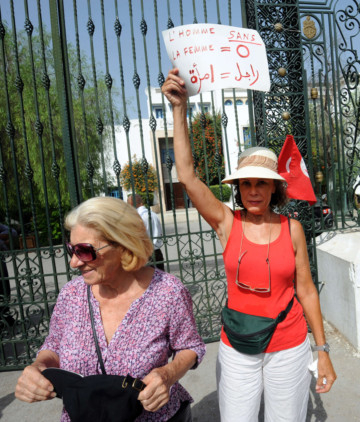
Tunis: Tunisian women are rising up against a proposed article in the new constitution seen by many as an Islamist ploy to reverse the principle of gender equality that made Tunisia a beacon of modernity in the Arab world when it was introduced six decades ago.
The National Constituent Assembly (NCA), elected after the downfall last year of dictator Zine Al Abidine Bin Ali, is currently drafting a new national charter.
A petition addressed to the NCA, and so far signed by more than 8,000 people on the internet, says “the state is about to vote on an article in the constitution that limits the citizenship rights of women, under the principle of their complementarity to men and not their equality.”
The petition stresses that women, who “are citizens just like men, should not be defined in terms of men.”
Meherzia, a teacher, told AFP that “equality becomes complementarity but in fact it is the whole legal framework for relations between men and women that changes.”
Lawyer Sadok Belaid, at a debate on the CSP at Tunisia’s Centre for Research on Women, said the “risks of regression are not just linked to women’s rights; it is a challenge to one whole model of society”.
The Human Rights League, feminist NGOs and the powerful General Workers’ Union (UGTT) are planning a march in the capital on Monday evening to coincide with the anniversary of the Personal Status Code’s promulgation.
The interior ministry has allowed the march to take place on Mohammad V Street in central Tunis, but not on the main road running though the capital, Habib Bourguiba Avenue.
In France, a group of NGOs and expatriates have also called for a gathering on Monday evening in Paris to “safeguard” the rights of Tunisian women.
The moderate Islamist party Ennahda, which heads the ruling three-party coalition after winning the first post-revolution polls in October, has repeatedly stressed its commitment to the rights of women and to the CSP.
Ennahda’s historic leader Rashid Gannouchi sought earlier this week to play down the controversy.
“Some MPs [in the NCA] have seen in this phrase some sort of retreat on fundamental principles like equality, on which there is a consensus between Ennahda and its main coalition partners,” the Congress for the Republic and Ettakatol, both centre-left parties, he said.
But many remain fundamentally opposed to the complementarity clause.
“We are demanding the withdrawal of this article pure and simple, as it constitutes an assault on the gains made by women and on their humanity,” Ahlem Belhaj, president of the Association of Women Democrats, told AFP.
And some rights are still to be gained. For years, feminists have demanded equality of inheritance. As it stands now under sharia [Islamic law], a woman is entitled to just half of what her brother receives.
The protest is even more poignant, coming amid controversy over 28-year-old Habiba Ghribi, who became the first Tunisian women ever to win an Olympic medal when she took the silver this week in the 3,000-metre steeplechase.
Ghribi wore typical running attire — shorts and a top that left her midrift bare — and the reaction from some quarters illustrates why Tunisian women are concerned.
“Tunisia does not need medals that come from women who are uncovered and naked. We should strip the nationality of she who has dishonoured Tunisia with her nudity and debauchery,” said one comment on Facebook.
That brought a retort from MP Ebrahim Kassas, of the independent Al Aridha party.
“The underpants of Habiba Ghribi have honoured us,” Kassas joked during a radio debate with female Ennahda MP Farida Labidi on Tuesday. “What have [Ennahda MPs’] underpants done for us?”











